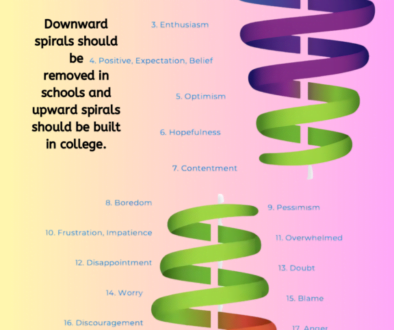Introduction: Understanding the Prevalence of “Resistance to Parental Advice”
Despite their intelligence and potential, high schoolers often seem immune to parental advice. As frustrating as it may be for parents who have their child’s best interests at heart, it’s crucial to dig deeper to understand why simple directives like “get up on time” or “study hard” don’t always yield the desired results.

Statistics indicate that up to 40% of high school students are chronically disengaged from their education, according to a Gallup Student Poll. Understanding this disengagement becomes critical for parents who have their child’s best interests at heart.
The Complexity of Teenage Independence: Why “Resistance to Parental Advice” Peaks During Adolescence
In this phase of life, teens are trying to assert their independence and find their own identity. When parents step in with directives, it may clash with this newfound sense of self, leading to resistance or outright disobedience.
According to the American Psychological Association, nearly 50% of adolescents report clashes with their parents over issues of independence and autonomy.
Situational Example: The Morning Struggle – When “Resistance to Parental Advice” Affects Basic Routines
Picture this: it’s 6:30 AM, and your teen has an 8 AM class. You knock on their door to wake them up, but they just grumble and pull the covers over their head.
Specific Solution: Instead of issuing a directive, involve them in creating their morning routine. Say something like, “You’ve got school and I’ve got work, so let’s figure out a morning plan together.” This participatory approach can make them more receptive to waking up early.
A survey by Sleep.org found that only 15% of teenagers get the recommended 8.5 hours of sleep on school nights, complicating their morning routines.
The Trap of Routine: How “Resistance to Parental Advice” Fuels Academic Disengagement
A common mantra in many households is, “Follow the routine, no matter how boring.”
Situational Example: The Boring Study Schedule – “Resistance to Parental Advice” and Its Impact on Study Habits
A report from the National Center for Education Statistics shows that homework quality, not quantity, is more closely associated with better academic performance.
You’ve set a study schedule for your child: two hours of study, fifteen minutes of break. You find them doodling or playing video games during their study time.
Specific Solution: Include your child in crafting the study schedule. Allow them to pick subjects they enjoy for certain slots. This not only alleviates boredom but also gives them ownership of their schedule, making adherence more likely.
According to a Pew Research Center study, only 30% of high school students feel engaged in their schooling, highlighting the inefficacy of monotonous routines.
The Misconception of Effort Equals Excellence: How “Resistance to Parental Advice” Can Lead to Misguided Academic Efforts
Parents often tell their teens to put in more effort as a guaranteed path to excellent grades, but that’s not always how it works.
Situational Example: The Math Conundrum – When “Resistance to Parental Advice” Affects Subject Mastery
Your child is good at English but struggles with math. You tell them to double their study hours for math, but the grades don’t improve.
Specific Solution: Consider hiring a tutor or identifying online resources that cater to their learning style. Pushing harder on a problem without changing the approach is the definition of insanity. Adapt your strategy to their needs.
The National Association for College Admission Counseling’s (NACAC) report reveals that grades and course rigor are the top factors in college admissions decisions, signaling that mere effort is not enough.
The Domino Effect: How “Resistance to Parental Advice” Can Lead to Missed Career and University Opportunities
Ignoring the complexities of teen behavior and sticking to a one-size-fits-all approach can have long-lasting repercussions. Failure to adhere to disciplined routines or effectively manage study schedules can lead to mediocre academic performance. These seemingly minor issues can accumulate over time, resulting in missed career opportunities and potentially affecting university admissions. An Ivy League dream can quickly become unattainable, not for a lack of intelligence, but because of missed opportunities to develop necessary life skills and habits.
A report from the U.S. Department of Education revealed that over 40% of students who start college never finish, often due to deficiencies in academic preparedness or life skills cultivated in high school.
Conclusion: Overcoming the Challenge of “Resistance to Parental Advice”
A Harvard study found that parents who engage with their teens in constructive problem-solving have kids who are 22% more likely to attend college.
The high school years are a complex period of psychological and emotional development. Commands from parents, however well-intentioned, often get lost in translation due to teens’ need for independence and identity formation. The key to effective parenting is not just instructing but involving them in decision-making, respecting their struggle for independence, and adapting your approach to their specific needs and inclinations.
For parents grappling with these challenges, expert guidance can be invaluable.I am an education consultant, specializing in helping high-end communities navigate the labyrinthine process of sending their children to top-tier/Best FIT universities abroad.
I understand the nuances of teen behavior and the importance of aligning their unique needs with their academic and life goals. By incorporating tailored strategies and personalized mentorship, I help families turn these challenging years into a launching pad for lifelong success. By utilizing my expertise, you’re not just becoming another statistic; you’re making a proactive choice to equip your child for future success.
By
Satyam Khanna


